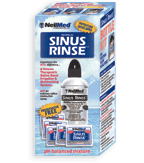As a long time sufferer of both allergic rhinitis and insomnia it comes as no surprise that hayfever and other forms of allergic rhinitis interfere with sleep.
Let's face it - it's pretty hard to get to sleep (initial insomnia) when you have to reach for a tissue every 30 seconds, or you find yourself sneezing and coughing. And even when you do get to sleep the quality of your sleep is likely to be impaired. If your nose is blocked you find yourself struggling to breathe and often wake with a sore throat from breathing through your mouth.
According to the study, funded by the pharmaceutical company, GlaxoSmithKline nearly half the people with allergic rhinitis reported difficulties falling asleep and nearly two-thirds reported that they had inadequate sleep.
Not surprisingly the helpful folks at GlaxoSmithKline put in a plug for their products suggesting that:
"Treating allergic rhinitis or other nasal symptoms may improve dramatically the quality of sleep. In the long term, such a strategy would have positive repercussions on a societal level; for example, the numbers of road and work accidents would be reduced. Considering the high incidence of allergic rhinitis and the high rate of associated sleep disorders, the issue is one of public health."
It seems a bit of a stretch to go from hayfever and poor quality sleep to "positive repercussions on a societal level" however I do believe that hayfever-type symptoms interfere with sleep.
I have tried a variety of treatments, both conventional and alternative. I have tried several nasal sprays, such as Eltair, Rhinocort and Beconase as well as anti-histamines and nasal
 decongestants, such as Sudafed. I have also tried aromatherapy inhalations of peppermint oil and eucalyptus. Unfortunately not much works. Vicks smeared under the nostril provides temporary relief, as does aromatherapy inhalations. The nasal decongestants and anti-histamines are pretty hit and miss. Sometimes they work, and sometimes the same medication has little or no effect.
decongestants, such as Sudafed. I have also tried aromatherapy inhalations of peppermint oil and eucalyptus. Unfortunately not much works. Vicks smeared under the nostril provides temporary relief, as does aromatherapy inhalations. The nasal decongestants and anti-histamines are pretty hit and miss. Sometimes they work, and sometimes the same medication has little or no effect.My latest treatment is a completely natural nasal rinse containing baking soda and salt. So far I've used it twice and it seems to work. Fingers crossed it will help me achieve a peaceful night's sleep.




































Anything that disrupts a good night sleep is a problem in my book. Man, I wish you luck. I've spent so many days feeling sleep deprived that I'm sure society as a whole was affected!
ReplyDelete